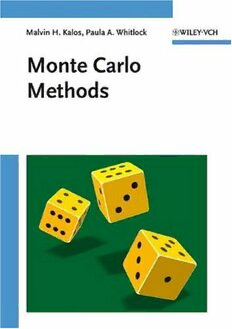Download Monte Carlo Methods PDF Free - Full Version
Download Monte Carlo Methods by Malvin H. Kalos, Paula A. Whitlock in PDF format completely FREE. No registration required, no payment needed. Get instant access to this valuable resource on PDFdrive.to!
About Monte Carlo Methods
This introduction to Monte Carlo Methods seeks to identify and study the unifying elements that underlie their effective application. It focuses on two basic themes. The first is the importance of random walks as they occur both in natural stochastic systems and in their relationship to integral and differential equations. The second theme is that of variance reduction in general and importance sampling in particular as a technique for efficient use of the methods. Random walks are introduced with an elementary example in which the modelling of radiation transport arises directly from a schematic probabilistic description of the interaction of radiation with matter. Building on that example, the relationship between random walks and integral equations is outlined. The applicability of these ideas to other problems is shown by a clear and elementary introduction to the solution of the Schrodinger equation by random walks. The detailed discussion of variance reduction includes Monte Carlo evaluation of finite-dimensional integrals. Special attention is given to importance sampling, partly because of its intrinsic interest in quadrature, partly because of its general usefulness in the solution of integral equations. One significant feature is that Monte Carlo Methods treats the "Metropolis algorithm" in the context of sampling methods, clearly distinguishing it from importance sampling. Physicists, chemists, statisticians, mathematicians, and computer scientists will find Monte Carlo Methods a complete and stimulating introduction.
Detailed Information
| Author: | Malvin H. Kalos, Paula A. Whitlock |
|---|---|
| Publication Year: | 1986 |
| ISBN: | 9783527617401 |
| Pages: | 199 |
| Language: | English |
| File Size: | 6.347 |
| Format: | |
| Price: | FREE |
Safe & Secure Download - No registration required
Why Choose PDFdrive for Your Free Monte Carlo Methods Download?
- 100% Free: No hidden fees or subscriptions required for one book every day.
- No Registration: Immediate access is available without creating accounts for one book every day.
- Safe and Secure: Clean downloads without malware or viruses
- Multiple Formats: PDF, MOBI, Mpub,... optimized for all devices
- Educational Resource: Supporting knowledge sharing and learning
Frequently Asked Questions
Is it really free to download Monte Carlo Methods PDF?
Yes, on https://PDFdrive.to you can download Monte Carlo Methods by Malvin H. Kalos, Paula A. Whitlock completely free. We don't require any payment, subscription, or registration to access this PDF file. For 3 books every day.
How can I read Monte Carlo Methods on my mobile device?
After downloading Monte Carlo Methods PDF, you can open it with any PDF reader app on your phone or tablet. We recommend using Adobe Acrobat Reader, Apple Books, or Google Play Books for the best reading experience.
Is this the full version of Monte Carlo Methods?
Yes, this is the complete PDF version of Monte Carlo Methods by Malvin H. Kalos, Paula A. Whitlock. You will be able to read the entire content as in the printed version without missing any pages.
Is it legal to download Monte Carlo Methods PDF for free?
https://PDFdrive.to provides links to free educational resources available online. We do not store any files on our servers. Please be aware of copyright laws in your country before downloading.
The materials shared are intended for research, educational, and personal use in accordance with fair use principles.

